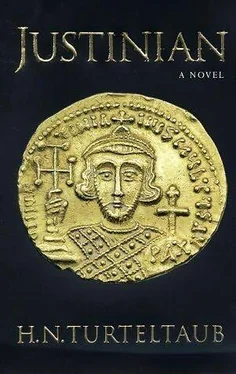Harry Turtledove - Justinian
Здесь есть возможность читать онлайн «Harry Turtledove - Justinian» весь текст электронной книги совершенно бесплатно (целиком полную версию без сокращений). В некоторых случаях можно слушать аудио, скачать через торрент в формате fb2 и присутствует краткое содержание. Жанр: Историческая проза, на английском языке. Описание произведения, (предисловие) а так же отзывы посетителей доступны на портале библиотеки ЛибКат.
- Название:Justinian
- Автор:
- Жанр:
- Год:неизвестен
- ISBN:нет данных
- Рейтинг книги:3 / 5. Голосов: 1
-
Избранное:Добавить в избранное
- Отзывы:
-
Ваша оценка:
- 60
- 1
- 2
- 3
- 4
- 5
Justinian: краткое содержание, описание и аннотация
Предлагаем к чтению аннотацию, описание, краткое содержание или предисловие (зависит от того, что написал сам автор книги «Justinian»). Если вы не нашли необходимую информацию о книге — напишите в комментариях, мы постараемся отыскать её.
Justinian — читать онлайн бесплатно полную книгу (весь текст) целиком
Ниже представлен текст книги, разбитый по страницам. Система сохранения места последней прочитанной страницы, позволяет с удобством читать онлайн бесплатно книгу «Justinian», без необходимости каждый раз заново искать на чём Вы остановились. Поставьте закладку, и сможете в любой момент перейти на страницу, на которой закончили чтение.
Интервал:
Закладка:
Because Bardanes Philippikos was a heretic who tried to overthrow the sixth holy ecumenical synod? I didn't know that then\a160… and I wouldn't have worried much about it if I did know.
You didn't hear that last? Well, never mind. Wasn't important anyhow.
JUSTINIAN
Shortly after learning that the Sklavenoi who had defected from the service they owed the Roman Empire were still tormenting us, I had equally unpleasant news from the opposite frontier: from, indeed, the uttermost west. Pope Sergios, taking the habitual presumption of the bishops of Rome to a new extreme, refused to ratify the canons to which the bishops I had assembled for the fifth-sixth synod had agreed.
I admit I was not entirely without warning the pope of Rome might behave in such arrogant and senseless fashion, several bishops from the west or under papal jurisdiction having predicted his descent into folly. But I also admit I had not credited their warning, being unable to believe any priest of God could not only ignore but reject canons promulgated by a synod through whose deliberations the Holy Spirit had surely worked.
Such presumption was all the more distasteful coming from the bishop of Rome. Without the military power of the exarch of Ravenna, the viceroy of the Roman Empire for Italy, the pope's miserable city would soon have fallen to the Lombards. Not only are the Lombards savage and barbarous even by standards prevailing in the west, they also profess the Arian heresy.
When I took counsel with the ecumenical patriarch Paul to formulate a joint response to Sergios's insolence, I spoke in anger: "We ought to let the Lombards have Rome and eat it up, and the pope with it. That would serve him as he deserves, the ungrateful wretch."
Paul coughed several times, deeply and wrackingly, before replying. The sickness of the lungs that would claim his life in the following year already had its hooks deep in him. When he could speak, he said, "Emperor, however much such a course might please you now, it would cause a great scandal throughout Christendom, and would do untold harm to the holy church in the west."
"Pope Sergios is doing great harm to the holy Christian church in the west," I retorted. "How dare he refuse to accept these canons after the synod decided they were proper and just?"
Paul sighed. "I regret the pope's stance no less than you, Emperor. The bishops in Rome being first in honor, they often deem themselves first in authority as well. You are not the first Emperor to discover this." He coughed again.
"I know," I said. "My grandfather exiled a pope for his disobedience. If I have to do the same, I tell you I shall not shrink from it."
"May that not come to pass," Paul said. "It would embroil the church in conflicts better left unkindled. Let us try first to bring the pope to reason."
"Very well," I said. "See to it, then." My father having devoted much of the energy of his reign to restoring unity within the church through the sixth holy ecumenical synod, I did not wish to damage his work by causing another schism. That was not the purpose for which I had convened the fifth-sixth synod. The reverse, in fact: I had intended it to clear up the problems the two previous ecumenical synods had ignored. I truly had not believed the pope of Rome might reject what the bishops prescribed.
A few days later, Paul gave me a draft of the letter he purposed sending to Pope Sergios. It was a small masterpiece of its kind, arguing the case so persuasively and brilliantly that I felt certain even the mulish bishop of Rome would be made to see the light. I wrote I have read and I approve on the draft, then returned it to the ecumenical patriarch.
He let me know when the letter left on a ship bound for Italy. It was, by then, quite late in the sailing season. I was not sure the letter would reach the pope before spring, and did not doubt his reply would not arrive in the imperial city till then. I dared hope Sergios would ponder his course through the winter months and, becoming more moderate with contemplation, would announce his acceptance of the canons when good weather once more permitted intercourse between his barbarous ruin of a city and the heartland of the Roman Empire.
One can always hope.
With spring came a resumption of the Arabs' raids on the eastern frontier of the Roman Empire. As had been true in the previous year, some of Neboulos's Sklavenoi served as guides to the deniers of Christ. I sent messengers renewing my order to burn those barbarians who fell into our hands.
Again, I received from Bardanes the son of Nikephoros vivid accounts of the Sklavenoi he had roasted. Again, they seemed too good to be true, so much so that I once more despatched spies to the east to learn whether he was telling me what he had done or what he hoped I wanted to hear. Again, my agents reported back to me that he had in fact given captives from the special army special treatment. In recognition of his zeal, I promoted him to kleisouriarch.
Spring also brought, as foretold, a reply from Pope Sergios. That reply nearly prostrated poor Paul, weak as he already was from his bodily illness. When he brought the letter to me, he had to be carried to the palace in a litter. His face was hardly more than skin and bones, and his hand looked skeletal as he passed the pope's missive to me.
The letter was in Greek, Sergios being familiar with that language because his family sprang from somewhere near Antioch, although he himself, Paul told me, had been born on the island of Sicily where my grandfather lost his life. Since it was in what is now the chief language of the Roman Empire, I had no trouble understanding it. Having read it, I should have preferred it to be in Latin or some other even more barbarous tongue, so I might have remained ignorant of its import.
In it, Sergios lyingly asserted his legates had affixed their signatures to the canons of the fifth-sixth council after being deceived as to the meaning of those canons. Since they had participated in the synod, their mendacity and that of the pope were made manifest. Sergios further claimed that the canons, decided upon after deliberation of the participating bishops and signed by all the patriarchs save him alone and by myself, went outside the usages of the church and were erroneous innovations. He said he would sooner die than consent to them.
"By the Mother of God," I said to Paul, "nothing would please me better than giving this vain and ignorant bishop exactly what he tells me he wants."
Paul tried to reply, and, after suffering a coughing fit that ended with bloody spittle at one corner of his mouth, succeeded: "Emperor, I pray you in the name of the holy church, exercise restraint. The pope is a fool, but he is also heir to Peter, patriarch of the see of Rome."
"The heir to Peter, patriarch of the see of Rome, is a fool," I answered, reversing his words, "and deserves to pay the penalty for his folly."
"Have mercy upon him, Emperor," the ecumenical patriarch begged.
I tugged at my beard, not wanting in the least to have mercy on any man who presumed to defy me. But Paul, plainly, was a dying man, making this request of me with what was almost the last of his strength. "Perhaps I can put him in fear," I said, "and in so doing warn him of his own fate unless he obeys."
"That would be better," Paul said eagerly, grasping at any straw of conciliation I offered.
And so, on the following day, I sent a letter to Zachariah the exarch of Ravenna, ordering him to send soldiers down to Rome, to seize some of Pope Sergios's closest followers, and to ship them to Constantinople for judgment. In due course, Zachariah wrote back to tell me he had obeyed my commands by sending one of his underlings, a certai n Sergios unrelated to the pope, down from Ravenna to Rome with enough men to lay hold of backers of the bishop of Rome.
Читать дальшеИнтервал:
Закладка:
Похожие книги на «Justinian»
Представляем Вашему вниманию похожие книги на «Justinian» списком для выбора. Мы отобрали схожую по названию и смыслу литературу в надежде предоставить читателям больше вариантов отыскать новые, интересные, ещё непрочитанные произведения.
Обсуждение, отзывы о книге «Justinian» и просто собственные мнения читателей. Оставьте ваши комментарии, напишите, что Вы думаете о произведении, его смысле или главных героях. Укажите что конкретно понравилось, а что нет, и почему Вы так считаете.












